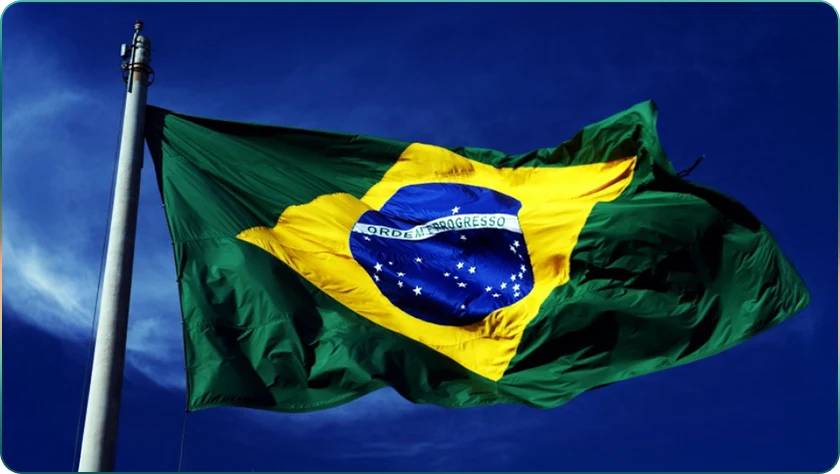The Betting Craze in Brazil - How Gambling Became a National Obsession

If you think of Brazil, you might think of Carnaval, caipirinhas on Copacabana beach, or Christ the Redeemer. Before long, inevitably, you’d also think of football. No country in the world has won the FIFA World Cup trophy more times than Brazil, and no country is as synonymous with the beautiful game. Football is in their blood, whether it’s playing, watching or — especially in recent years — betting on the sport. Millions of Brazilians have taken to online betting in the past five years, feeding an industry that has grown exponentially as demand has risen.
But this month marked a turning point: for the first time, Brazilian online sports betting companies were granted licenses to operate legally within the country. Until now, Brazilians had wagered a staggering 68.2 billion reais ($12.2 billion) on offshore platforms in the year between June 2023 and June 2024. The government’s move to regulate the market aims to bring that revenue back home, but it also raises urgent questions about the societal impact of the nation’s burgeoning gambling addiction.

The Illegal Past - Sports Betting in the Shadows
For decades, gambling in Brazil was confined to the shadows. After President Eurico Gaspar Dutra banned most forms of gambling in 1946 under moral and religious pretexts, betting activities went underground. The prohibition did little to stifle the popularity of “Jogo do Bicho” (literally translated as “the animal game”), an illegal lottery deeply ingrained in Brazilian culture. Operated by “bicheiros” (illegal gambling bosses), Jogo do Bicho thrived despite periodic crackdowns, becoming a symbol of both defiance and community identity.
Jogo do Bicho operated as a simple yet compelling numbers game. Players would bet on one of 25 animals, each representing a number. Daily results were drawn, and winners would receive payouts based on their wagers. The game’s simplicity and ubiquity made it accessible to all, from market vendors to office workers. At its height, the illegal lottery generated millions of reais in revenue every day, enriching operators and embedding itself into Brazilian society.
Despite its popularity, the game was not without controversy. Addiction to Jogo do Bicho was a concern, particularly among lower-income individuals who saw it as a way to escape financial hardship. The game’s underground nature also led to associations with organized crime, as operators used their wealth and influence to bribe officials and evade punishment.
Famous crackdowns, such as the 1993 “Operação Mãos Limpas” (Clean Hands Operation), highlighted the game’s pervasive corruption and its links to political figures. This operation exposed an intricate web of illicit financing tied to Jogo do Bicho and an absence of anti-money laundering compliance, leading to high-profile arrests and temporarily disrupting its operations. However, the game’s deeply rooted cultural presence allowed it to rebound and continue flourishing in certain regions.
Remarkably, Jogo do Bicho remains popular in certain regions of Brazil today, operating in a legal grey area. While technological advancements and the rise of online betting have overshadowed it, the game’s cultural significance endures, particularly among older generations. It stands as a testament to Brazil’s complicated history with gambling—a mix of tradition, controversy, and resilience.
While Jogo do Bicho was largely a street-level activity, football betting was minimal during this era. Enthusiasts had few options aside from informal bets among friends. However, with the rise of the internet in the early 2000s, offshore sportsbooks began targeting Brazilians. Platforms based in countries with lenient gambling laws provided Brazilians a gateway to football betting. The absence of gambling regulation in Brazil meant that this growing underground market operated unchecked, leaving players vulnerable to fraud and the government deprived of billions in potential tax revenue.
The Rise of Offshore Sports Betting Sites in the 2000s
By the early 2000s, offshore sportsbooks had begun capturing the attention of Brazilian bettors, taking advantage of the regulatory vacuum created by the 1946 gambling ban. Websites operated by international companies allowed Brazilians to wager on sports legally, albeit in a legal grey area for the players themselves. These platforms offered a variety of options that weren’t available domestically, including live betting, international football matches, and even novelty betting events.
Evidence of their popularity came from multiple sources. During this period, Brazilian authorities conducted sporadic crackdowns on illegal gambling rings that collaborated with offshore platforms. High-profile police operations, such as those targeting money laundering through online gambling networks, highlighted the scale of the issue. A series of police investigations uncovered an extensive web of offshore betting sites funneling profits through local middlemen, resulting in several arrests and asset seizures. However, these crackdowns were often short-lived and failed to significantly curb the activity.
Reports of gambling addiction began to surface, with psychologists and social workers noting an increase in patients seeking help for compulsive betting. Many of these individuals were drawn to offshore sportsbooks in Brazil by aggressive marketing campaigns and promises of quick wins. Social media platforms and forums became hotbeds for discussions about betting strategies, further normalizing the practice among younger audiences.
The government’s response was largely ineffective. Efforts to block websites were easily circumvented by users employing VPNs, and legislative proposals to address online gambling stalled in Congress. This inaction allowed offshore operators to thrive, capturing billions of reais in annual wagers and laying the groundwork for the massive betting culture seen in Brazil today.
Sports Betting Legalization: A Delayed Revolution
The watershed moment came in December 2018, when then-President Michel Temer signed Law No. 13,756, legalizing fixed-odds sports betting. The decision was framed as an economic opportunity to generate tax revenue and modernize Brazil’s gaming sector. Yet, the legislation’s implementation lagged. While the law provided a legal framework, it left crucial details—such as licensing requirements and regulatory oversight—unresolved. This regulatory vacuum persisted for years, allowing international operators to dominate the Brazilian market.
The delay in regulation was not merely bureaucratic. Political infighting and resistance from conservative factions slowed progress, even as the betting industry flourished unofficially. Between June 2023 and June 2024, Brazilians spent over $12 billion on offshore platforms, a figure that underscored the market’s vast potential. The lack of domestic licensing meant that while Brazilians’ gambling habits grew, the country reaped none of the economic benefits.
January 2025 marked a turning point with the issuance of the first licenses to Brazilian sports betting operators. The government granted these licenses to both local and international operators, including household names like bet365, Betano, and Sportingbet, alongside emerging Brazilian brands like PixBet and Galera.bet. The process required companies to pay substantial licensing fees (around $4.8 million), comply with strict regulations, and demonstrate their ability to operate transparently and responsibly.
The new regulatory framework also included a 30% gross revenue tax on operators, with the proceeds earmarked for public services like healthcare and education. Licensing requirements mandated robust consumer protection measures, including age verification, anti-money laundering protocols, and mechanisms to combat problem gambling. The government’s goal was twofold: to capture revenue that had previously flowed offshore and to establish a safer, more accountable betting environment for Brazilian consumers.
This shift has transformed the industry practically overnight, creating a competitive domestic market that now directly benefits the Brazilian economy. The government’s approach aims to strike a balance between fostering economic growth and addressing the societal challenges posed by widespread gambling.
Why Sports Betting Exploded in Brazil?
The legalization of sports betting coincided with a unique confluence of cultural and technological factors that fueled its rapid growth. Football—the lifeblood of Brazilian sports culture and key to the country’s very identity—played a central role. The nation’s deep emotional connection to football made betting on matches a natural extension of the fan experience. The ability to predict outcomes, wager on live events like goal scorers or the number of corners, and celebrate victories added an extra layer of excitement to an already fervent passion for the game.
At the same time, technological advancements amplified accessibility. The proliferation of smartphones and widespread internet connectivity enabled millions of Brazilians to access betting platforms with ease. Apps from Brazil’s major operators, like bet365 and Betano became popular overnight, offering intuitive interfaces and real-time betting options. This seamless integration of technology and sports betting turned it into an everyday activity for many Brazilians.
The industry’s growth was also driven by aggressive advertising campaigns and sponsorships. Nearly every major football club in Brazil’s Serie A partnered with betting companies, prominently displaying their logos on kits and in stadiums. As of 2023, nearly 95% of the clubs in Brazil’s top-tier Serie A have partnerships with betting companies, ranging from shirt sponsorships to other forms of collaboration. Rio de Janeiro’s Botafogo secured a sponsorship deal with international bookmaker VBet, while São Paulo team Red Bull Bragantino recently entered into a two-year agreement with Betfast, designating the betting company as the club’s main shirt sponsor until the end of 2026.
These partnerships underscore the deepening relationship between football clubs and the betting industry in Brazil. Sponsorships not only provide financial support to clubs but also normalize gambling as an integral part of the football experience. The omnipresence of betting advertisements during football broadcasts—familiar to anyone who has ever watched a football match in Europe too—has further reinforced this cultural shift.
Additionally, the economic allure of sports betting attracted a wide demographic. For many Brazilians, particularly those from lower-income backgrounds, gambling offered a chance to improve their financial situation. The dream of turning small wagers into significant payouts resonated deeply, making sports betting an appealing, albeit risky, pastime.
Social media and influencer culture further amplified the trend. Platforms like Instagram and TikTok became hubs for betting tips, strategies, and promotions, often targeted at younger audiences. The pervasive influence of these platforms contributed to the rapid normalization of sports betting among Brazil’s youth.
The High Stakes of Sports Betting
The explosive growth of sports betting in Brazil has come at a significant human cost. Gambling addiction has emerged as a pressing issue, with psychologists and social workers reporting a surge in cases. For many individuals, the excitement of betting quickly spirals into compulsive behavior. The psychological toll is severe, leading to anxiety, depression, and strained relationships. Despite these challenges, the stigma surrounding gambling addiction prevents many from seeking the help they need.
The financial consequences are equally troubling. For lower-income Brazilians, gambling losses can be devastating. Stories of individuals losing their life savings have become alarmingly common. A recent study revealed that nearly a third of regular gamblers in Brazil spend more than they can afford, resulting in mounting debts and financial instability. This economic strain often exacerbates existing inequalities, as those most vulnerable are disproportionately affected.
Young people are particularly at risk. The integration of betting into football culture has made it an enticing activity for teenagers and young adults. Many young Brazilians view gambling as a harmless form of entertainment, unaware of the risks of addiction and financial ruin. Schools and community leaders have expressed concern over the growing prevalence of betting among students, with some warning that it could lead to long-term societal issues.
Ripple Effects of Brazil’s Gambling Craze
As Brazil’s sports betting frenzy reached new heights, evidence emerged that the trend might be impacting consumer spending in other areas. According to recent reports, Brazilians are increasingly diverting discretionary income towards gambling, leaving less to spend on retail, dining, and other non-essential services. This shift has raised alarms among economists, who warn that while the government may benefit from taxes on betting revenue, the broader economy could suffer from reduced consumption in key sectors.
Retailers in São Paulo and Rio de Janeiro, two of the nation’s largest consumer markets, have reported slowing sales growth in recent months. Anecdotal evidence suggests that some consumers are prioritizing sports betting over more traditional forms of entertainment and leisure spending. Financial analysts have noted that this trend, if sustained, could dampen economic growth by shifting funds away from activities that stimulate the broader economy.
Despite these warnings, the betting industry continues to thrive. Analysts predict that as licensed operators establish themselves in the domestic market, spending on sports betting is likely to increase further. The challenge for policymakers will be to strike a balance between fostering a lucrative betting industry and ensuring that its growth doesn’t come at the expense of other economic sectors.
The Government Response: Regulation and Enforcement
In light of these challenges, the Brazilian government has taken decisive steps to regulate the burgeoning betting market. The recently implemented licensing framework aims to bring offshore betting activity under domestic control, ensuring that a significant portion of the industry’s revenue flows into public coffers.
A key feature of the new regulations is a 30% tax on gross gaming revenue, which will fund essential services such as healthcare and education. Additionally, operators are required to implement robust consumer protection measures, including tools for responsible gambling, age verification, and anti-money laundering protocols. These safeguards are designed to minimize the social harm associated with gambling while fostering a transparent and accountable industry.
Enforcement efforts have also been ramped up. Authorities have announced plans to crack down on unlicensed operators and impose hefty fines on companies that fail to comply with the new regulations. International cooperation has been sought to block offshore platforms that continue to target Brazilian consumers, and local law enforcement agencies have been tasked with dismantling illegal betting operations within the country.
The government has also launched public awareness campaigns to educate citizens about the risks of gambling addiction. Advertisements on television, radio, and social media platforms emphasize the importance of responsible betting and provide information on where to seek help. While these initiatives are still in their early stages, they represent a proactive approach to addressing the human costs of sports betting.

What Lies Ahead for Sports Betting in Brazil
As Brazil’s sports betting industry enters a new era of regulation and domestic growth, its future remains uncertain. The potential for economic benefits is immense, with projections indicating that the industry could generate billions in tax revenue annually. This windfall could fund critical infrastructure projects, improve public services, and create jobs, providing a much-needed boost to the economy.
However, the social challenges associated with gambling must not be overlooked. Addiction rates are likely to rise as betting becomes more accessible, particularly among young people and lower-income groups. The government’s ability to enforce regulations and provide support for those affected by gambling addiction will be crucial in mitigating these risks.
The role of technology will also shape the industry’s future. As artificial intelligence and data analytics become increasingly integrated into betting platforms, operators will gain new tools to enhance user experiences and target customers more effectively. While these innovations could drive growth, they also raise ethical concerns about the potential for exploitation and the erosion of consumer privacy.
Finally, the cultural impact of sports betting on Brazil will continue to evolve. The intertwining of football and gambling has already reshaped the way fans engage with the sport, and this trend is likely to deepen in the coming years. Whether this shift will enhance or detract from the nation’s beloved football culture remains to be seen.
In conclusion, Brazil’s journey from underground gambling to a regulated sports betting market is a story of rapid transformation, marked by both opportunities and challenges. As the nation grapples with the implications of its newfound betting boom, it must navigate a complex landscape of economic, social, and cultural dynamics to ensure a sustainable and equitable future.





Review this Blog
Leave a Comment
User Comments
comments for The Betting Craze in Brazil - How Gambling Became a National Obsession